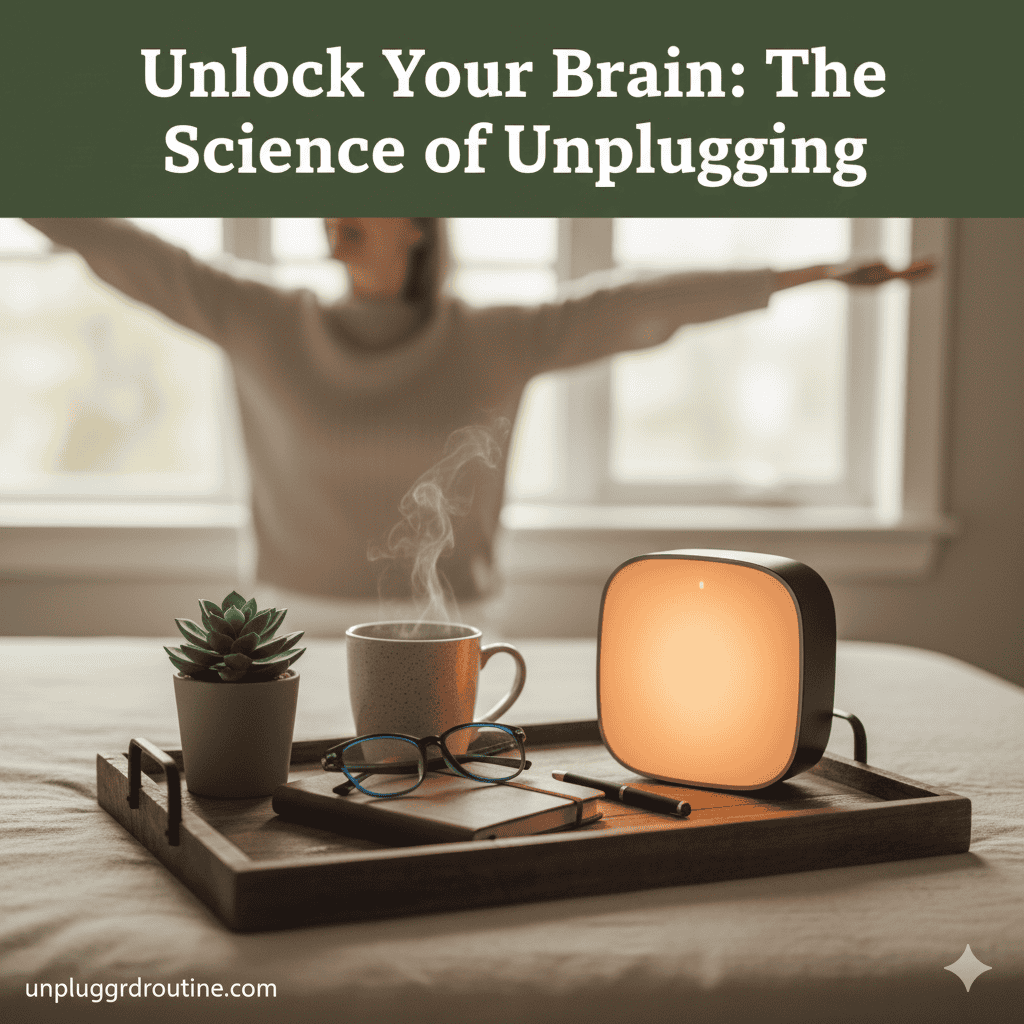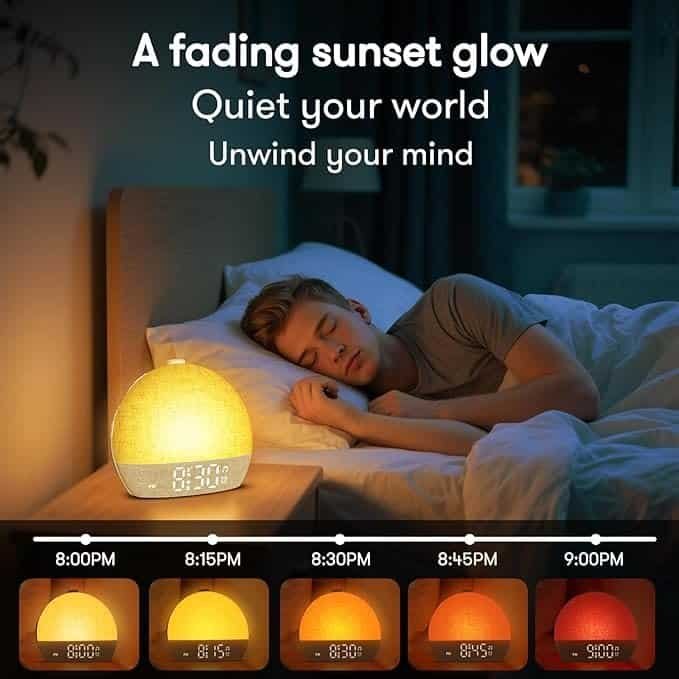In the hyper-connected landscape of 21st-century America, our days often begin not with a gentle awakening, but with a digital jolt. The default setting for millions of us is to grab the smartphone that served as our alarm, instantly plunging into emails, social media feeds, or breaking news. This isn’t just a bad habit; it’s a profound misstep for our brains, brains that are still transitioning from sleep to full wakefulness.
We’re told to “hustle harder,” to “always be on,” and with remote work blurring the lines between home and office, the pressure to be instantly responsive is higher than ever. But what if this constant connection is actually sabotaging our ability to perform at our best? This article will dive deep into the science of unplugging, revealing precisely how and why screen-free mornings are not just a luxury but a crucial strategy for enhancing focus, stabilizing mood, and cultivating genuine well-being in the relentless American pace of life. Prepare to understand the hidden mechanisms at play and reclaim your most precious resource: your mind.

Part I: The Brain on Screens – What Happens When You Plug In Too Soon
To truly appreciate the power of unplugging, we first need to understand the immediate impact of early morning screen time on our neurochemistry and psychology.
The Alpha Wave Interruption: Why Your Brain Hates Instant Notifications
When you first wake up, your brain isn’t immediately ready for prime time. It naturally transitions through various brainwave states. The period just after waking is often characterized by Alpha and Theta brainwaves. This is a precious window where your brain is highly receptive to creativity, intuitive thought, and calm reflection. It’s a gentle, restorative state that allows for integration and a soft entry into consciousness.
However, when you grab your phone, you force an abrupt shift into Beta brainwaves. Beta waves are associated with high-alert, focused, analytical thinking – precisely what’s needed for navigating a busy inbox or parsing complex news. This sudden jolt bypasses the natural transition, robbing your brain of critical time it needs to process and prepare. This “neurological whiplash” contributes to a sense of overwhelm, anxiety, and a feeling of being behind schedule before the day has even properly begun. The science of unplugging suggests that allowing this natural progression fosters a more resilient and centered mental state.
The Dopamine Reward Loop: Training Your Brain for Distraction
Social media, news apps, and email platforms are masterfully engineered to exploit our brain’s reward system. Each notification, “like,” or new email triggers a tiny release of dopamine, a neurotransmitter associated with pleasure and motivation. This creates a powerful feedback loop. Your brain quickly learns that checking your phone provides instant, albeit fleeting, gratification.
The problem? These micro-doses of dopamine train your brain to seek out constant, low-effort stimulation. Later in the day, when you need to tackle deep work—tasks requiring sustained focus and cognitive effort (like writing a report, strategizing, or complex problem-solving)—your brain has been conditioned to prefer the quick, easy hits. This makes it harder to concentrate, leading to procrastination and a constant struggle against internal and external distractions. Early morning screen time essentially kickstarts a cycle of distraction that can derail your entire day, making it harder to implement effective Morning Unplugging Rituals.
Cortisol Spike: Starting Your Day with Stress
Beyond dopamine, early morning screen time, especially when encountering stressful news or work emails, can trigger the release of cortisol, our primary stress hormone. Cortisol is essential for our fight-or-flight response, but chronically elevated levels are detrimental to health and cognitive function. Starting your day with a cortisol spike primes your body for stress, leading to:
- Increased anxiety: A feeling of unease and worry.
- Reduced creativity: A narrow focus on threats, rather than opportunities.
- Impaired decision-making: Reactive rather than proactive choices.
For the American professional constantly battling burnout, this physiological response is particularly damaging.
Part II: The Science of Unplugging in Action – How Screen-Free Mornings Transform Your Brain
Now that we understand the problem, let’s explore the powerful neurological and psychological benefits of embracing screen-free mornings, grounded in scientific principles.
Enhancing Focus: Training Your Prefrontal Cortex
The prefrontal cortex (PFC) is the “executive control center” of your brain, responsible for attention, planning, decision-making, and impulse control. When you engage in screen-free activities, you give your PFC a chance to warm up and strengthen itself without being constantly interrupted or overloaded.
- Mindful Activities: Engaging in activities like journaling, meditation, or even a quiet walk, allows your PFC to practice sustained attention without external digital prompts. This is like strength training for your focus muscles.
- Reduced Cognitive Load: By not immediately consuming complex information, your brain has fewer “tabs open” in its mental browser. This frees up cognitive resources for the day’s actual work, leading to improved task initiation and completion, a significant advantage in demanding US workplaces.
Mood Stabilization: Regulating Neurotransmitters Naturally
Screen-free mornings are a powerful tool for mood regulation, promoting the natural release of beneficial neurochemicals.
- Serotonin Boost: Exposure to natural light (by opening curtains, stepping outside) in the morning helps regulate your circadian rhythm and boosts serotonin production. Serotonin is crucial for feelings of well-being and happiness. This is a far more sustainable mood lift than the transient dopamine hits from your phone.
- Reduced Cortisol: By avoiding stressful news or work messages, you prevent that early morning cortisol spike. This allows your stress response system to remain calm, leading to lower baseline anxiety throughout the day.
- Cultivating Presence: Engaging in activities like mindful stretching, savoring a cup of coffee, or quiet reflection promotes present-moment awareness, which has been scientifically linked to reduced rumination and increased emotional stability. This counters the constant future- and past-oriented thinking often fueled by digital inputs.
Boosting Creativity and Problem-Solving: The Default Mode Network
The Default Mode Network (DMN) is a network of brain regions that becomes active when your mind is at rest, not focused on an external task. It’s often associated with mind-wandering, introspection, and imagining future scenarios. Counter-intuitively, allowing your DMN to activate during screen-free mornings is crucial for creativity and problem-solving.
- Incubation Period: When you step away from constant input, your brain gets a chance to process information, make connections, and generate novel ideas. Many breakthroughs happen during these “aha!” moments when the mind is allowed to wander.
- Improved Insight: Researchers have found that giving the brain periods of rest can significantly improve insight problem-solving. By not immediately bombarding your brain with external stimuli, you allow for this valuable internal processing. This is especially vital for American innovators and entrepreneurs constantly seeking their next big idea.
Part III: Implementing The Science of Unplugging: Actionable Strategies for the US Lifestyle
Understanding the “why” is crucial, but now let’s focus on the “how” for busy Americans.
Rewiring Your Morning: Practical Steps for Digital Freedom
1. The Digital Sunset & Sunrise Rule
- Action: No screens (phone, tablet, laptop) in the bedroom. Period. Charge your phone in a communal area like the kitchen or living room.
- US Adaptation: This might feel like a radical step in a culture that treats phones as extensions of ourselves. Invest in a dedicated, analog alarm clock or a sunrise alarm clock (an excellent solution that gently wakes you without a screen). This small investment yields enormous returns for your mental health. Imagine waking up to a gentle light, rather than the blare of your work alarm on your phone, tempting you to check Slack.

2. The First 30-60 Minutes: Sacred Screen-Free Time
- Action: Designate the first 30-60 minutes after waking as completely screen-free.
- Practical US Examples:
- Hydration & Movement: Drink a large glass of water. Then, take a short walk around your neighborhood (getting that natural light!), do some simple stretches, or follow a quick yoga routine on your TV, not your phone to avoid distraction. This isn’t about becoming a fitness guru; it’s about signaling to your body that the day has begun with intention.
- Mindful Consumption: Instead of scrolling, try journaling for 5-10 minutes. A “brain dump” of worries or a gratitude list can clear mental clutter. Or, read a physical book or magazine. Savor your coffee or tea. These simple acts engage your senses and cultivate presence, a direct counter to the fragmented attention of digital media.
3. The “Work Firewall”: Protecting Your Productivity
- Action: If your job demands early responsiveness (common with remote teams across time zones), establish a specific, limited window for checking work-related communications after your unplugged ritual.
- Combating Remote Work Overwhelm: Instead of checking emails at 6:30 AM, commit to your unplugged routine first. Then, at a set time (e.g., 8:30 AM), dedicate a strict 15-minute block to rapidly triage truly urgent work messages. Do not get sucked into lengthy responses or deep dives. This approach respects the science of unplugging by delaying cognitive load.
Understanding Resistance: Why We Gravitate to Screens
Acknowledging the challenges is part of the science of unplugging. Our brains are wired for efficiency, and phone checking has become an automated, often unconscious, habit.
- Fear of Missing Out (FOMO): The anxiety that you’re missing out on important news, social updates, or work developments. This is particularly prevalent in US culture, where social and professional networking are highly valued.
- Perceived Productivity: The false belief that being instantly responsive makes you more productive. In reality, it often leads to reactive, rather than proactive, work.
- Addiction Loop: The dopamine hits create a subtle addiction that makes it genuinely hard to break the habit. Be kind to yourself, but firm.
The American Advantage: Leveraging Unplugged Mornings for Success
For Americans navigating a competitive landscape, screen-free mornings offer a significant edge:
Enhanced Innovation: A well-rested, focused mind is a creative mind. Unplugging allows for the “incubation” periods necessary for breakthroughs in problem-solving and ideation—critical for entrepreneurs and innovators.
Stronger Relationships: Investing in present-moment interactions (even with yourself) before the digital demands begin fosters emotional resilience, leading to better communication and stronger personal and professional connections.
Burnout Prevention: By prioritizing mental well-being, you build a sustainable foundation for long-term productivity and career longevity, combating the widespread burnout crisis facing the US workforce.
Embrace The Science of Unplugging – Reclaim Your Mind
The evidence is clear: how you begin your day profoundly shapes your focus, mood, and overall well-being. By understanding and applying the science of unplugging, you are not just breaking a bad habit; you are implementing a powerful, evidence-based strategy to optimize your brain for peak performance and sustained happiness.
In a world that constantly demands your attention, taking back your morning is an act of self-empowerment. It’s an investment in a calmer, more focused, and more resilient you—a version of yourself better equipped to tackle the demands of the American hustle with grace and efficacy.
Ready to experience the profound benefits of a screen-free morning? Don’t just read about the science of unplugging; put it into practice! Challenge yourself for the next 7 days: no phone for the first hour after waking. Visit today to download our “Morning Brain Reset Guide,” a free resource with prompts and tips to help you cultivate a truly screen-free start to your day and reclaim your focus and mood!